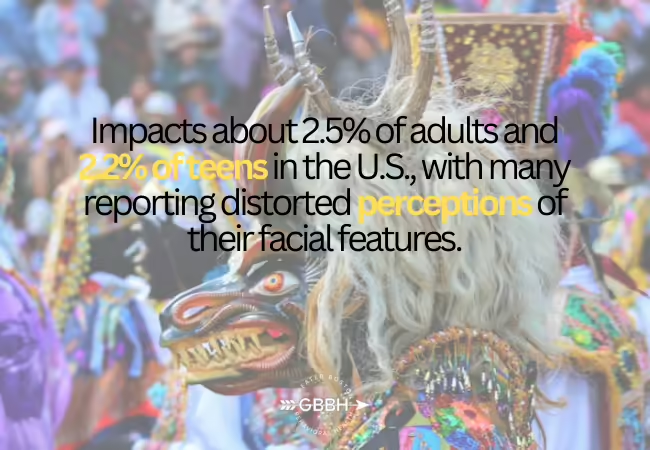“Demon Face Syndrome” is a term used to describe a psychological or neurological phenomenon in which individuals perceive distorted, grotesque, or demonic facial imagery in themselves or others. While not an officially recognized medical condition, it is often associated with underlying mental health or neurological disorders, such as psychosis, body dysmorphic disorder (BDD), or trauma-related conditions. These distorted perceptions can be deeply distressing and interfere with daily life, relationships, and emotional well-being.
For individuals experiencing such symptoms in Boston, seeking support through behavioral health in Boston, anxiety treatment programs, or trauma-focused care at a Mental Health Treatment Center in Boston can provide effective solutions to address the underlying causes and alleviate symptoms. This blog delves into the possible causes, symptoms, impacts, and comprehensive treatment options for those experiencing “Demon Face Syndrome.”
What is Demon Face Syndrome?
“Demon Face Syndrome” refers to the experience of perceiving distorted, frightening facial images in mirrors, photographs, or even directly in other people. These visual misinterpretations can range from subtle distortions to full-blown hallucinations of grotesque or “demonic” features. Although the term is not formally recognized in the Diagnostic and Statistical Manual of Mental Disorders (DSM-5), it is often symptomatic of deeper psychological or neurological conditions.
Common Contexts of Demon Face Syndrome
- Psychosis: Hallucinations, including distorted facial imagery, are a hallmark of psychotic disorders such as schizophrenia or bipolar disorder with psychotic features.
- Body Dysmorphic Disorder (BDD): Intense preoccupation with perceived flaws in appearance may lead individuals to see their own reflection as grotesque or “demonic.”
- Trauma and PTSD: Traumatic experiences may manifest as intrusive visual distortions or flashbacks involving facial imagery.
- Neurological Disorders: Conditions affecting visual processing, such as Charles Bonnet Syndrome or epilepsy, may also result in distorted facial perceptions.
While the experience of “Demon Face Syndrome” can be terrifying, it is a symptom rather than a standalone condition, requiring comprehensive evaluation and treatment.
Causes of Demon Face Syndrome
The causes of “Demon Face Syndrome” are multifaceted, often involving a combination of psychological, neurological, and environmental factors. Understanding the root cause is crucial for effective intervention.
1. Mental Health Conditions
- Schizophrenia: Visual hallucinations, including distorted faces, occur in up to 27% of individuals with schizophrenia, often due to altered brain activity.
- Body Dysmorphic Disorder (BDD): Individuals with BDD may fixate on minor or nonexistent flaws in their appearance, leading to distorted self-perception.
- Severe Anxiety and Depression: Emotional distress can amplify intrusive thoughts and distort reality, leading to experiences of grotesque imagery.
2. Neurological Factors
- Charles Bonnet Syndrome: Common in individuals with vision loss, this condition causes vivid hallucinations, including distorted or frightening faces.
- Occipital Lobe Dysfunction: Damage or irregular activity in the brain’s visual processing center may lead to misinterpretation of facial features.
- Temporal Lobe Epilepsy: Seizures in this region can cause visual and sensory hallucinations, including facial distortions.
3. Trauma and Stress
- Post-Traumatic Stress Disorder (PTSD): Trauma survivors often experience flashbacks or visual hallucinations triggered by past events, which can manifest as distorted facial images.
- Sleep Deprivation: Chronic lack of sleep can result in hallucinations, including distorted perceptions of faces, due to heightened brain stress.
4. Environmental Triggers
- Excessive exposure to media or imagery involving grotesque or demonic faces may contribute to distorted visual memories, particularly in individuals with pre-existing vulnerabilities.
Symptoms of Demon Face Syndrome
“Demon Face Syndrome” is a phenomenon where individuals perceive distorted, grotesque, or frightening facial images in themselves or others. These symptoms are often distressing and can be linked to underlying mental health or neurological conditions. Recognizing these symptoms is crucial for identifying the need for professional intervention.
1. Visual Symptoms
- Facial Distortions: Individuals may see exaggerated or “demonic” features in mirrors, photos, or even directly on others’ faces. These distortions can vary in intensity and frequency, ranging from subtle changes to extreme grotesqueness.
- Hallucinations: Persistent visual experiences that include distorted or frightening facial imagery, often occurring in moments of stress, anxiety, or fatigue.
- Fluctuating Perceptions: The severity of these visual distortions may change based on lighting, emotional state, or external triggers, leading to unpredictability in symptoms.
2. Emotional Symptoms
- Fear and Anxiety: The experience of seeing distorted faces can trigger overwhelming fear, panic, or dread.
- Paranoia: Individuals may feel paranoid or mistrustful, believing the distortions represent reality or carry a deeper meaning.
- Shame and Guilt: Repeated episodes may lead to feelings of embarrassment or self-blame, particularly if the individual is aware that these perceptions are not real.
3. Cognitive Symptoms
- Intrusive Thoughts: Distorted facial imagery can dominate thoughts, making it difficult to focus on other tasks or conversations.
- Difficulty Distinguishing Reality: Episodes may blur the line between real perceptions and hallucinations, increasing confusion.
- Obsessive Focus: A heightened preoccupation with facial imagery or the fear of encountering these distortions again.
4. Behavioral Symptoms
- Avoidance: Individuals may avoid mirrors, photographs, or social interactions to prevent distressing experiences.
- Repetitive Behaviors: Compulsive actions, such as checking reflections or covering mirrors, may develop as coping mechanisms.
- Withdrawal: Fear of judgment or misunderstanding can lead to social isolation or reluctance to seek help.
Impact of Demon Face Syndrome on Daily Life
The symptoms of “Demon Face Syndrome” can significantly disrupt various aspects of life, affecting emotional well-being, relationships, and daily responsibilities. The pervasive fear and confusion caused by these visual distortions make professional support essential for recovery.
1. Emotional Well-Being
- Heightened Anxiety: Repeated episodes can create a cycle of anticipatory anxiety, where individuals constantly worry about when the next visual distortion will occur.
- Depression: Persistent distress and feelings of helplessness can contribute to depressive symptoms, including sadness, hopelessness, and low self-esteem.
- Emotional Exhaustion: The ongoing fear and confusion associated with hallucinations can lead to burnout and emotional fatigue.
2. Relationships
- Strained Interactions: Loved ones may struggle to understand the individual’s experiences, leading to miscommunication and frustration.
- Social Withdrawal: Fear of being judged or misunderstood often causes individuals to avoid social situations, which can result in loneliness and isolation.
- Impact on Family Dynamics: Family members may feel overwhelmed or helpless in supporting the individual, further straining relationships.
3. Professional and Academic Challenges
- Decreased Productivity: Intrusive thoughts and hallucinations can make it difficult to concentrate, meet deadlines, or perform tasks efficiently.
- Missed Opportunities: Fear of encountering triggers in the workplace or school may lead to absenteeism or reluctance to take on new challenges.
- Workplace Stigma: Misunderstandings about mental health symptoms can create additional stress in professional settings.
4. Physical Health
- Neglect of Self-Care: Individuals may neglect basic needs, such as eating, sleeping, or exercising, during episodes of heightened distress.
- Stress-Related Conditions: Chronic anxiety and fear can contribute to physical health issues, including headaches, digestive problems, or high blood pressure.
- Sleep Disturbances: Nightmares or fear of hallucinations may lead to insomnia or poor sleep quality, exacerbating symptoms.
5. Quality of Life
- Loss of Independence: Severe symptoms may prevent individuals from performing daily tasks, such as grocery shopping, driving, or attending appointments.
- Reduced Enjoyment: Fear and avoidance behaviors can limit participation in hobbies, social events, or family activities.
- Perpetuation of Symptoms: The distress caused by these impacts often worsens symptoms, creating a self-reinforcing cycle.
Treatment Options for Demon Face Syndrome
Comprehensive treatment for “Demon Face Syndrome” focuses on addressing the underlying mental health or neurological conditions while equipping individuals with tools to manage symptoms effectively.
1. Therapy-Based Interventions
Therapy is a cornerstone of treatment, helping individuals understand and manage their experiences.
- Cognitive-Behavioral Therapy (CBT):
- Identifies and reframes distorted thought patterns contributing to visual misinterpretations.
- Teaches grounding techniques to manage hallucinations and intrusive thoughts.
- Trauma Therapy Program:
- Addresses unresolved trauma using techniques like Eye Movement Desensitization and Reprocessing (EMDR).
- Reduces trauma-related triggers that may exacerbate symptoms.
- Family Therapy Program:
- Educates loved ones about the condition and fosters supportive communication.
- Group Therapy Program:
- Creates a safe space to share experiences and learn coping strategies from peers.
2. Medication Management
Medications can help alleviate symptoms of underlying conditions associated with “Demon Face Syndrome.”
- Antipsychotics: Manage hallucinations and other psychotic symptoms in conditions like schizophrenia.
- Antidepressants: Treat co-occurring anxiety or depression.
- Mood Stabilizers: Address mood dysregulation in individuals with bipolar disorder.
3. Structured Programs
For individuals with severe or persistent symptoms, structured programs provide intensive support.
- Intensive Outpatient Programs (IOPs):
- Offer regular therapy and support while allowing individuals to maintain daily routines.
- Partial Hospitalization Programs (PHPs):
- Provide a higher level of care with daily therapeutic interventions and medical supervision.
4. Lifestyle Modifications
- Mindfulness Practices: Techniques like meditation and deep breathing help reduce stress and manage visual distortions.
- Art Therapy: Creative outlets provide a way to process and express emotions related to distorted perceptions.
- Healthy Sleep Hygiene: Consistent rest can reduce hallucinations linked to sleep deprivation.
Why Professional Support is Essential
Experiencing “Demon Face Syndrome” can be distressing and isolating, but professional intervention offers relief and strategies for long-term recovery.
Benefits of Professional Support
- Accurate Diagnosis: Identifies underlying conditions contributing to visual distortions.
- Tailored Treatment Plans: Combines therapy, medication, and lifestyle strategies for comprehensive care.
- Ongoing Support: Provides tools to prevent relapses and improve overall well-being.
How Greater Boston Behavioral Health Can Help
At Greater Boston Behavioral Health, we specialize in treating complex mental health conditions with compassion and evidence-based care. Our services include:
- Anxiety and Depression Treatment Programs: Address co-occurring conditions that often accompany visual distortions.
- Trauma Therapy Programs: Help individuals process and heal from trauma-related triggers.
- Family and Group Therapy Programs: Foster community and support among loved ones and peers.
- IOPs and PHPs: Provide structured care for those needing regular therapeutic intervention.
Final Thoughts
“Demon Face Syndrome,” while distressing, is a symptom of underlying conditions that can be effectively treated. With professional support, individuals can regain control over their perceptions and improve their quality of life.
If you or a loved one is experiencing symptoms of “Demon Face Syndrome,” Greater Boston Behavioral Health is here to help. Contact us today at (888)278-0716 to learn more about our programs and take the first step toward recovery and healing.
FAQs on Demon Face Syndrome
What causes Demon Face Syndrome?
Possible causes include:
- Mental health conditions like schizophrenia, body dysmorphic disorder (BDD), or severe anxiety.
- Neurological factors such as Charles Bonnet Syndrome or occipital lobe dysfunction.
- Trauma and stress, including PTSD or sleep deprivation.
What are the symptoms of Demon Face Syndrome?
Symptoms include:
- Seeing distorted or frightening faces in mirrors, photos, or real life.
- Overwhelming fear, anxiety, or paranoia during episodes.
- Intrusive thoughts or difficulty distinguishing reality from hallucinations.
How does Demon Face Syndrome impact daily life?
It can lead to:
- Emotional distress, including anxiety and depression.
- Social withdrawal and strained relationships.
- Reduced productivity at work or school due to intrusive symptoms.
How is Demon Face Syndrome treated?
Treatment focuses on addressing the underlying cause and may include:
- Therapy: Cognitive-Behavioral Therapy (CBT), trauma-focused therapy, and group therapy.
- Medication: Antipsychotics, antidepressants, or mood stabilizers for managing symptoms.
- Structured Programs: Intensive Outpatient Programs (IOPs) or Partial Hospitalization Programs (PHPs).
Can Demon Face Syndrome be managed with lifestyle changes?
Yes, incorporating mindfulness practices, maintaining healthy sleep habits, and engaging in art or creative therapies can help reduce distressing symptoms.


